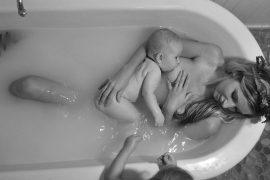- Help her to feel comfortable and confident
Help create a comfortable breastfeeding space – Comfort is important for breastfeeding whether it’s a cosy corner in your nursery or a place on the couch. Each feed is likely to be between 30 – 60 mins so having everything at arm’s reach and ‘just-so’ is helpful. Back support with cushions and a small foot stool. A glass of water within reach. It’s the little things that make a difference.
Limit visitors until she’s feeling confident – Family and friends are of course eager to meet your new baby but the early days and weeks are really important in getting breastfeeding going well. She needs time to feel confident unclipping her bra, getting her breast out, positioning baby on and off until it feels right, milk squirting everywhere…It’s a fumble at first and it’s hard to gain confidence when you’re feeling watched. Ask visitors to come again in a few days.
There’s no reason for her to cover up – Your baby is feeding. It’s that simple. Your partner is providing this basic need for survival. If visitors to your home feel uncomfortable with her feeding in front of them then they should leave! (Or perhaps suggest that they put a scarf over their own head). If she prefers, a simple muslin wrap may make her feel more confident when you’re out and about and you can help hold it up whilst she gets baby settled on the breast. By law, breastfeeding babies have a right to feed where and when they choose – no covering up is required.
- Help her get the help she needs
One of the hardest things to do is stand by and watch a loved one struggle. When breastfeeding is not going as planned, suggesting formula is not a supportive offer of help for a mother who wants to breastfeed. It will add to her already intense feelings of failure and inadequacy and may lead her to believe you don’t support her efforts to breastfeed (and that wasn’t your intention at all!). Help her get the right support to address her concerns and breastfeeding needs – contact your local breastfeeding helpline, visit your health nurse with a list of questions, or ask a lactation consultant to visit you at home.
When breastfeeding is not going as planned, suggesting formula is not a supportive offer of help for a mother who wants to breastfeed.
- Take charge of the non-feeding stuff to create your own bonding time
Breastfeeding is exclusively a mother – baby relationship. But feeding is just one of your baby’s needs.
- Burping and settling after feeds is a great way to have skin-to-skin cuddles and a relaxed, quiet time together.
- Nappy changing and dressing is a round-the-clock task. The non-breastfeeding partner can change nappies and know baby’s output is OK. You can then give positive feedback to mum that she is doing a good job and giving baby all the milk baby needs.
- Bathing can be a really soothing and calming time for everyone. Consider taking a bath with your baby and enjoy a special daily closeness.
- Take photos of mum and baby together. You’d be surprised at how few photos taken in the early weeks actually have mum in them!
- Accept offers of help.
People love to help! Try not to let an offer of help feel like a reflection on your upkeep of the house. Give visitors the menial tasks of washing dishes, sweeping and vacuuming the floor and putting the washing on. Let yourself focus on supporting your new family and allow others to support you in your supportive role. Put your feet up sometime too.
- Look after yourself so that you can be more available
One of the many magical things about breastfeeding is that it contains a hormone (cholecystokinin) that protects breastfeeding mums from severe sleep deprivation. This hormone also helps mums maximise the few hours of sleep she gets each day. So although she has had just a few hours, her body feels as though she’s had a lot more sleep. This hormone passes through the breast milk to baby which is where he gets his beautiful “milk drunk” look after a feed.
This “wonder drug” hormone is exclusive to breastfeeding mums and bubs – partners can’t get it! But partners can get exhausted from lack of sleep. If you have only had a few hours’ sleep in the past few days then that’s all your weary body has to function on. So it’s okay, and actually a really good idea, to catch up on sleep when you can during the day and it’s also okay to leave the breastfeeding to mum overnight and get as much sleep as you can. When you’re rested you’re a much better help than if you’re exhausted.
Rowena Gray is a mother to 3 young daughters, nurse, midwife and International Board Certified Lactation Consultant (IBCLC) and has been both a consumer and giver of copious amounts of breastfeeding advice! She is the author of ‘Born to Breastfeed – the first six weeks and beyond’. Described as having your very own personal Lactation Consultant on your bookshelf, its easy to read layout includes trouble-shooting tables to help you match your baby’s behaviour to what is happening with breastfeeding. Born to Breastfeed – the first six weeks and beyond is available in bookstores and online. www.rowenagray.com.au










